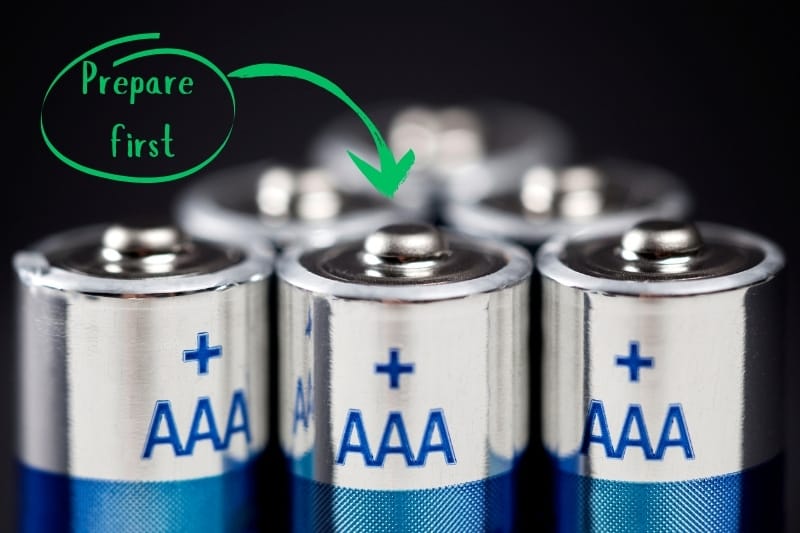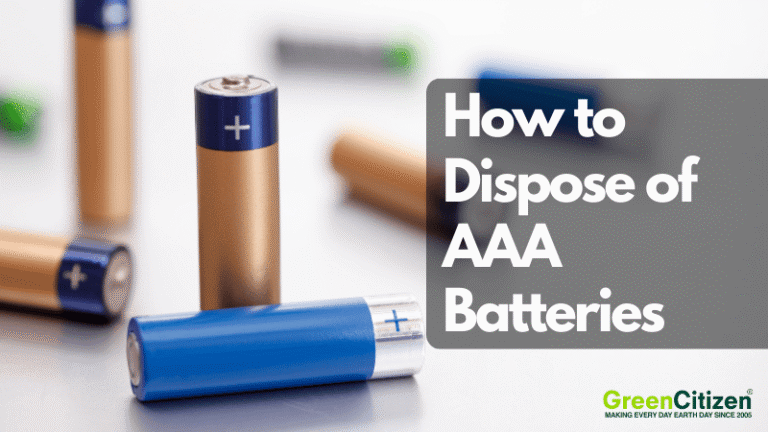AAA batteries are everywhere—inside remote controls, flashlights, kitchen timers, and toys. But when they die, most people ask the same question: Can you throw away AAA batteries?
The answer isn’t so simple. Tossing them in the trash might seem harmless, but improper AAA battery disposal can lead to environmental damage, fire hazards, and toxic waste.
Whether you’re dealing with single-use or rechargeable AAA batteries, the key is safe, responsible recycling. These small power cells often contain materials like cadmium or lithium, which shouldn’t end up in landfills. That’s why understanding how to dispose of AAA batteries properly is so important.
From household hazardous waste facilities to retail drop-off bins and mail-in recycling programs, you have options. And if you’re searching for AAA battery disposal near me, we’ll cover that too. This guide walks you through where to recycle AAA batteries, how to prepare them, and what to avoid—so nothing ends up where it shouldn’t.
Key Takeaway: How to Dispose of AAA Batteries the Right Way
AAA batteries should never be thrown in the trash. Recycle them through certified drop-off locations, mail-in programs, or community events. Always tape terminals and sort by type for safety. Use tools like the Green Directory to find trusted AAA battery disposal near you and protect the environment from toxic waste.
Do’s and Don’ts for AAA Battery Disposal
A few simple precautions can make a big difference when disposing of AAA batteries. Use this quick checklist to stay safe, legal, and environmentally responsible.
✅ Do:
❌ Don’t:
- Tape the terminals with non-conductive tape to prevent short circuits
- Sort batteries by type (alkaline, lithium, rechargeable) before recycling
- Use certified drop-off sites, mail-in programs, or hazardous waste facilities
- Store used batteries in a plastic container or sealed bag before transport
- Check your local laws—some states ban battery disposal in regular trash
- Don’t throw AAA batteries in your household trash (especially rechargeable or lithium types)
- Don’t store damaged or leaking batteries in bulk
- Don’t mix different battery types when recycling
- Don’t forget to prep batteries—unprepared ones may be rejected by recyclers
Can You Recycle AAA Batteries?
Yes, you can recycle AAA batteries. Single-use AAA batteries can be recycled at household hazardous waste facilities, recycling centers, and some retail drop-off locations. Rechargeable AAA batteries—like lithium or NiMH types—must be recycled through certified programs, as they contain hazardous materials.
AAA battery disposal keeps toxic metals out of landfills and reduces fire risks.
Inside a AAA battery are metals and chemicals that make recycling essential. Alkaline AAA batteries contain zinc, manganese dioxide, and steel. Rechargeable versions may include nickel, lithium compounds, or even cadmium in older models. These materials, though vital for powering devices, pose serious environmental threats when not disposed of properly.
Toxic metals like cadmium and lithium can leach into soil and groundwater, contaminating ecosystems and drinking water supplies. Some AAA batteries also present a fire risk—especially lithium types—which can ignite or explode in landfills or waste trucks when damaged or exposed to heat.
That’s why responsible AAA battery disposal matters. If you’re searching for AAA battery recycling near you, check with local waste agencies or use the Green Directory to find certified drop-off points.
Similarly, lead-acid batteries used in automotive applications contain hazardous components that require proper handling and disposal to comply with environmental regulations and safety precautions.
And for added safety, tape battery terminals and separate types before recycling.
How to Prepare AAA Batteries for Safe Recycling

Recycling AAA batteries isn’t just about finding a drop-off point—it’s about preparing them properly to avoid safety hazards and ensure proper processing.
Follow these essential steps before you recycle AAA batteries or take them to a disposal center:
1. Identify the Battery Type
Check whether the battery is alkaline, lithium, or rechargeable NiMH. Different types are processed in different ways, especially at hazardous waste facilities. If you’re unsure, check the battery label or packaging. Sorting AAA batteries by chemistry ensures safer and more efficient recycling.
2. Inspect for Damage
Look for leaks, swelling, or corrosion—these are signs of dead or damaged batteries that may pose a fire risk or leak toxic substances. Handle carefully and place any compromised batteries in a sealed bag before disposal. Most HHW facilities accept damaged batteries separately.
3. Tape the Terminals
Use non-conductive tape (like masking or electrical tape) to cover the terminals. This prevents short circuits during storage and transport—especially important for rechargeable AAA batteries, which may still hold a residual charge. Terminal taping is legally required in some areas.
4. Store and Sort by Type
Place batteries in a plastic container or zip bag and group them by chemistry. Many battery recycling programs require sorting to prevent contamination. Proper sorting improves processing and helps facilities recover valuable metals safely.
Preparing batteries before drop-off makes AAA battery disposal safer, legal, and more effective—for you and the planet.
How to Dispose of AAA Batteries Safely and Legally
Proper AAA battery disposal helps prevent toxic chemicals from leaking into soil and water—and reduces the risk of fires.
Whether you’re dealing with alkaline, lithium, or rechargeable NiMH AAA batteries, these safe and legal methods ensure your old batteries don’t harm the environment.
1. Household Hazardous Waste (HHW) Facilities
Many local governments run HHW collection sites that accept AAA batteries. These facilities are designed to process batteries containing heavy metals like cadmium or lithium safely.
Most accept alkaline AAA batteries and rechargeable AAA batteries for free. Use your city’s municipal waste site to locate AAA battery disposal near you.
Before drop-off, tape the terminals and sort by battery type to prevent short-circuiting.
2. Retail Battery Recycling Programs
Stores like Best Buy, Staples, Home Depot, and Lowe’s offer in-store bins to recycle AAA batteries.
These drop-off programs usually accept both single-use and rechargeable types.
Check the signage to confirm the battery types they accept. This is one of the most convenient ways to recycle AAA batteries if you’re already shopping at these retailers.
3. Mail-in Battery Recycling Kits
If there’s no recycling center near you, use a certified mail-in program.
Companies like Call2Recycle and Big Green Box send you a collection container with prepaid shipping.
You can recycle AAA batteries—including lithium and NiMH types—safely from anywhere in the U.S. These programs are perfect for remote areas or bulk battery disposal.
4. Community Collection Events
Many towns host seasonal e-waste recycling events where you can drop off AAA batteries along with old electronics and appliances. These drives accept multiple types of batteries and often partner with certified recyclers.
Watch your city’s events calendar or public works website for updates.
Can I Throw Away AAA Batteries?
No, you should not throw away AAA batteries—especially rechargeable or lithium-based types. In many states, it’s illegal to toss them in the trash because they contain hazardous materials like cadmium, lithium, or nickel that can pollute soil and water.
Even alkaline AAA batteries, while legal to trash in some areas, are best recycled to avoid fire risks and recover reusable metals. When disposed of in household waste, damaged batteries can spark fires in trash trucks or landfills—especially if the terminals touch other metals or batteries.
State laws vary:
- California, New York, and Minnesota prohibit throwing away any type of battery.
- Other states may allow alkaline battery disposal in regular trash, but still encourage recycling.
If you’re unsure of the rules in your area, use the Green Directory or contact your local solid waste agency. To stay safe and eco-conscious, always recycle AAA batteries at certified drop-off sites or through mail-in recycling programs.
Is It Illegal to Throw Away AAA Batteries in the Trash?
The legality of throwing away AAA batteries depends on where you live—and what type of battery you’re disposing of. In some states, tossing any battery in the trash is illegal.
In others, only rechargeable or hazardous batteries are restricted, while alkaline batteries are still allowed in household garbage.
States Where It’s Illegal to Throw Away AAA Batteries
States like California, New York, and Minnesota have strict regulations that prohibit throwing any batteries—including AAA alkaline batteries—into the trash.
In these states, household batteries are considered universal waste, meaning they must be recycled through proper channels such as hazardous waste facilities or certified drop-off programs. Violators can face fines or other penalties for improper disposal.
What About Other States?
In most other states, alkaline AAA batteries are not classified as hazardous waste and can legally be placed in the trash.
However, this does not apply to rechargeable AAA batteries (such as lithium-ion or nickel metal hydride), which are regulated federally under the Battery Act (Mercury-Containing and Rechargeable Battery Management Act). These must be recycled at certified facilities, regardless of your state laws.
Even if legal, trashing AAA batteries poses real risks:
- Fire hazards from residual charge or battery rupture
- Toxic leaching of metals like cadmium and lithium into soil and water
- Loss of recoverable materials like zinc, manganese, and nickel
Where Can I Recycle AAA Batteries Near Me?
You can recycle AAA batteries through local hazardous waste facilities, retail drop-off locations, community events, or certified mail-in programs. If you’re wondering “Where can I recycle AAA batteries near me?”—start with the Green Directory.
This free search tool helps you find nearby recycling centers by ZIP code. Just enter your location, select the battery category, and set your preferred search radius. You’ll get a list of certified recycling facilities, including whether they accept household batteries like AAA.
The Green Directory is especially helpful if:
- Your city’s waste website is outdated or unclear
- You’re looking for safe AAA battery disposal options in your area
- You need to recycle both single-use and rechargeable AAA batteries
While details may vary by listing, the Green Directory points you to trusted recyclers who handle household batteries responsibly.
👉 Use the Green Directory today and keep those dead AAA batteries out of the landfill.
Small Batteries, Big Responsibility: Start Recycling Today
It’s easy to overlook AAA batteries because of their size, but they pose big environmental risks if thrown away. These tiny cells can leak toxic metals into soil and water—or spark fires when damaged. That’s why responsible AAA battery disposal is more important than ever.
Recycling AAA batteries keeps hazardous waste out of landfills and helps recover valuable materials like zinc, manganese, and nickel. Whether they’re single-use or rechargeable, every battery you recycle makes a difference.
Need help finding a drop-off point? The Green Directory makes it easy. Just enter your ZIP code and search radius to locate trusted recycling centers near you that accept household batteries.
Don’t let dead batteries pile up in your drawer—or worse, end up in the trash. Recycle your AAA batteries today and take one small step toward a cleaner, safer planet.
